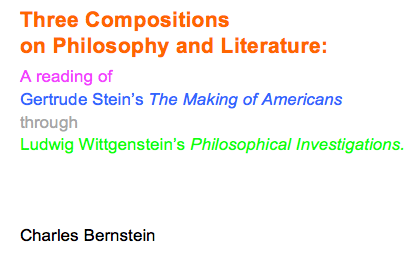
Three Compositions on Philosophy and Literature (1972)
A reading of Gertrude Stein’s 'The Making of Americans' through Ludwig Wittgenstein’s 'Philosophical Investigations'

Asylum’s Press Digital Edition
available free as .epub, .mobi (for Kindle), and PDF for printing
Forty years ago, during my last semesters of college, I wrote a senior thesis on Gertrude Stein’s Making of Americans, which I read in the context of Ludwig Wittgenstein’s Philosophical Investigations. I had concentrated in philosophy at Harvard even though my interests were primarily literature and art (poetics and aesthetics). I didn’t know anyone who had read Stein but was surrounded by philosophers deeply engaged with Wittgenstein. Still, I saw two key issues that Stein addressed in her early work that related to the philosophical problems that echoed through Emerson Hall, where Stein herself had studied with William James.
Throughout The Making of Americans, Stein confronts the problem of what she calls “the real thing of disillusionment”: a sense of being a stranger, queer, to those around her; the sinking feeling that one is not, and perhaps cannot be, understood, that drives you to cry out in pain that you write for “yourself and strangers,” in Stein’s famous phrase. Stein’s formulations struck me as being connected to the problem of other minds, or skepticism, a virtual obsession of Stanley Cavell in those years. It seemed to me that Stein and Wittgenstein had crafted a related response to skepticism.
The related philosophical issue that Stein’s work addresses is the nature of meaning and reference in verbal language: how words refer to objects in the external world. Both Wittgenstein and Stein dramatize the breakdown of a one-to-one correspondence between word and object. They are both averse to the conception that words are akin to names or labels and that meaning is grounded in a verbal mapping of a fully constituted external world. What do words or phrases designate? This goes beyond the issue of private language, which has dogged the interpretation of Stein’s work. The problem of where the pain is when pain is expressed opens up for Wittgenstein and his interpreters (for me primarily Rogers Albritton and Cavell) a more general problem of the nature of reference, designation, and naming for such intangibles as (in Stein’s words) “thinking, believing, seeing, understanding.” I felt, still do, that this philosophical conundrum directly bears on the meaning and reference of not just words or phrases in poems but of poems themselves, which certainly mean, designate, and express, but do not necessarily refer to “things,” if things are assumed to be already existing and named objects. I am not satisfied with the argument I make about the nature of reference in the final sections of The Making of Americans and Tender Buttons, where Stein invented a compositional method that I call “wordness.” Still, despite the manifest shortcomings of this work, it locates some ongoing problems that remain to be addressed, both in terms of a full-scale reading of The Making of Americans and a more technically robust account of reference in works such as Tender Buttons.
Looking back, I am aware of how circumscribed my frame of reference was in 1971. I am content here to play straight man (third Stein) to Stein and Wittgenstein, those diaphanously queer, secular Jews born just fifteen years apart.
Three Compositions on Philosophy and Literature (1972)
available free as .epub, .mobi (for Kindle), and PDF for printing
The 1925 first publication of The Making of Americans is available for download at Google Books.
My thanks to the Archive for New Poetry at the University of California, San Diego, for making available the manuscript. Jeff Boruszak helped prepare the digital version.